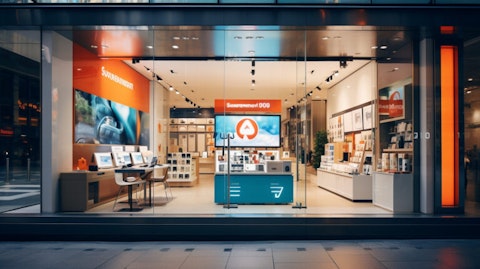In this article, we discuss 10 best retail ETFs to buy. If you want to skip our discussion on the retail industry, head over to 5 Best Retail ETFs To Buy.
In 2024, the retail industry is marked by a blend of optimism and challenges. Retailers are buoyed by a newfound sense of hope, driven by the transformative potential of technology, particularly the emergence of generative AI. This optimism is tempered, however, by ongoing economic uncertainties and the lingering aftermath of past disruptions.
Deloitte’s Global Retail Outlook 2024 report brings some good news, based on insights from 200 retail leaders around the world. It shows that many retailers are feeling positive about their future earnings and profits. In Europe, especially, retailers are feeling very confident about making more money. However, even with this positive outlook, retailers know that the way people shop online is changing, which presents both opportunities and challenges. Although online shopping is bringing in more money, it is also causing some problems, like expensive delivery costs. Returns management emerges as a significant operational challenge for retailers, particularly in the landscape of online retail. Consumers increasingly leverage free-return policies, exacerbating costs and complicating supply chain logistics. In response, retailers are exploring innovative strategies, leveraging technology to improve product information and mitigate return rates. In the future, retailers will adopt strategic methods to broaden their revenue streams, utilizing resources like customer data to strengthen their retail media ventures and broaden their B2B service options. They are also considering acquiring and consolidating technology services to enhance operational efficiency and expansion in a highly competitive environment.
In the evolving landscape of retail in 2024, Forbes identified several major trends that are reshaping the industry, offering both challenges and opportunities. Firstly, sustainability is a major concern for consumers, leading to increased demand for eco-friendly products and transparent business practices. However, businesses must ensure their sustainability efforts are genuine to earn consumer trust. Secondly, AI technology, especially generative text, is transforming customer engagement and operational efficiency for businesses. While AI adoption offers numerous benefits, it is essential for businesses to maintain a balance between automation and human interaction. Thirdly, social commerce is on the rise, blurring the lines between online shopping and entertainment on social media platforms. This trend creates opportunities for businesses to utilize live shopping features and collaborate with content creators to connect with customers authentically. Lastly, personalized engagement is becoming more important as customers seek tailored communication from brands. The use of chatbot marketing and targeted messaging allows businesses to interact with customers on a personal level, enhancing the overall customer experience.
Retail sales in the US surpassed expectations in December 2023, driven by increased purchases of motor vehicles and online goods. This positive performance, reported by the Commerce Department, led economists to revise their growth forecasts for the fourth quarter upwards. The strong retail sales data challenges previous expectations of an interest rate cut by the Federal Reserve in March. Despite concerns about potential recession, experts suggest that the economy is in a favorable position for moderate interest rate adjustments in 2024. In December, retail sales increased by 0.6%, following a 0.3% gain in November. This growth was fueled by a variety of factors, including improved availability of goods following pandemic-related disruptions and early holiday shopping trends. Online sales surged by 1.5%, reflecting the ongoing trend towards digital shopping. However, not all sectors experienced growth, with declines observed in electronics, appliances, and furniture stores. Meanwhile, restaurants and bars saw unchanged sales, potentially indicating cautious consumer spending despite previous surges in November. While concerns about consumer spending persist, especially among low-income households facing rising debt levels, economists remain optimistic about sustained spending in 2024. Factors such as potential government stimulus packages and ongoing improvements in the labor market could further support consumer confidence and spending.
Some of the best retail stocks to buy include Amazon.com, Inc. (NASDAQ:AMZN), Meta Platforms, Inc. (NASDAQ:META), and Costco Wholesale Corporation (NASDAQ:COST) (see 11 best retail stocks to buy). However, we discuss the best retail ETFs in this article.
Our Methodology
We curated our list of the best retail ETFs by choosing consensus picks from multiple credible websites. We have mentioned the 5-year share price performance of each ETF as of April 1, 2024, ranking the list in ascending order of the share price performance. We have also discussed the top holdings of the ETFs to offer better insight to potential investors.

A retail store showcasing an in-store advertising solution with the company branding.
Best Retail ETFs To Buy
10. ProShares Online Retail ETF (NYSE:ONLN)
5-Year Share Price Performance as of April 1: 1.52%
ProShares Online Retail ETF (NYSE:ONLN) aims to replicate the performance of the ProShares Online Retail Index, excluding fees and expenses. The fund was launched on July 13, 2018. As of March 28, 2024, ProShares Online Retail ETF (NYSE:ONLN)’s portfolio consists of 18 stocks, and the fund features an expense ratio of 0.58%. It is one of the best retail ETFs to buy.
Amazon.com, Inc. (NASDAQ:AMZN) is the largest holding of ProShares Online Retail ETF (NYSE:ONLN). On March 27, investment firm BTIG suggested that Amazon.com, Inc. (NASDAQ:AMZN)’s stock could see an upward movement, citing its technical chart. BTIG noted that the stock could potentially rise above $200 per share from its current trading price of around $179 per share, representing approximately a 12% increase.
According to Insider Monkey’s fourth quarter database, 293 hedge funds were bullish on Amazon.com, Inc. (NASDAQ:AMZN), compared to 286 funds in the last quarter.
Alger Spectra Fund stated the following regarding Amazon.com, Inc. (NASDAQ:AMZN) in its fourth quarter 2023 investor letter:
“Amazon.com, Inc. (NASDAQ:AMZN) is a well-known online retailer and cloud computing leader. The company’s Amazon Web Services (AWS) business provides utility-scale cloud offerings that facilitate corporate America’s transition to digital systems. During the quarter, shares contributed to performance as Amazon reported strong fiscal third quarter results, where the company beat sales and earnings estimates. Moreover, AWS growth remained steady. contributing to Amazon’s better-than-expected operating income despite concerns around cloud cost optimizations, showing signs of increasing net new cloud workloads. While management noted that customers remain price-conscious and focused on deals, demand remains strong across all segments, leading the company to raise their fiscal fourth quarter revenue and operating income guidance.”
9. Tema ETF Trust – Tema Luxury ETF (NYSE:LUX)
5-Year Share Price Performance as of April 1: 1.67%
Tema ETF Trust – Tema Luxury ETF (NYSE:LUX) is an actively managed fund aiming for long-term growth through investments in luxury industry companies. The luxury sector encompasses fashion, accessories, automobiles, hospitality, and beauty. As of March 28, 2024, Tema ETF Trust – Tema Luxury ETF (NYSE:LUX) had $8.45 million in assets under management, with a portfolio comprising 32 stocks and a net expense ratio of 0.75%. It is one of the best retail ETFs to buy.
LVMH Moët Hennessy – Louis Vuitton, Société Européenne (OTC:LVMUY) is the largest holding of Tema ETF Trust – Tema Luxury ETF (NYSE:LUX). LVMH is a global luxury goods company that offers a wide range of products including wines, spirits, fashion and leather goods, perfumes and cosmetics, watches and jewelry, custom-designed yachts, and hospitality services. The company operates under multiple prestigious brands such as Louis Vuitton, Dior, Fendi, Givenchy, Bulgari, Sephora, and more.
In addition to Amazon.com, Inc. (NASDAQ:AMZN), Meta Platforms, Inc. (NASDAQ:META), and Costco Wholesale Corporation (NASDAQ:COST), LVMH Moët Hennessy – Louis Vuitton, Société Européenne (OTC:LVMUY) is one of the top retail stocks to monitor.
8. Amplify Online Retail ETF (NYSE:IBUY)
5-Year Share Price Performance as of April 1: 16.78%
Amplify Online Retail ETF (NYSE:IBUY) aims to mirror the performance of the EQM Online Retail Index before fees and expenses. This index consists of a diverse range of companies that generate substantial revenue from different online retail sectors, including traditional online retail, online travel, online marketplace, and omni channel retail. Amplify Online Retail ETF (NYSE:IBUY) ranks 8th on our list of the best retail ETFs. The fund was established on April 20, 2016. As of March 28, 2024, the ETF held net assets worth $183.4 million and an expense ratio of 0.65%. Amplify Online Retail ETF (NYSE:IBUY)’s portfolio consists of 71 stocks.
Carvana Co. (NYSE:CVNA) is the top holding of Amplify Online Retail ETF (NYSE:IBUY). Carvana Co. (NYSE:CVNA) runs an e-commerce platform facilitating the buying and selling of used cars. On March 12, Jefferies upgraded Carvana’s rating from Underperform to Hold, citing operational improvements that could result in sustained financial benefits. Jefferies also increased its price target on Carvana from $30 to $85, representing an 8.8% rise from the stock’s previous price.
According to Insider Monkey’s fourth quarter database, 40 hedge funds were long Carvana Co. (NYSE:CVNA), compared to 38 funds in the last quarter.
Kerrisdale Capital made the following comment about Carvana Co. (NYSE:CVNA) in its June 2023 investor letter:
“We are short shares of Carvana Co. (NYSE:CVNA), a $4bn market cap online platform for buying and selling used cars. Originally hyped up as an innovative disruptor, Carvana is now recognized to be just a poorly run auto retailer struggling under the challenges of a severe industry downturn and the unsustainable burden of $6.5bn in debt. While many have shared concerns over Carvana’s business before, we voice ours at a time when shares have risen 165% in only a month on misguided optimism for profits that amount to little more than buffing the paint job on a totaled car.
Over its history of burning billions of dollars of investor capital to manufacture topline growth, Carvana has never generated sustainable profits or free cash flow. Even during the pandemic, when Carvana was virtually the only online option for scores of desperate car buyers willing to pay any price, the company failed to turn an annual profit. As the prospect of bankruptcy loomed, last year management began slashing costs, shrinking its operations and finessing working capital to try to generate positive free cash flow, and still failed. The company is pursuing a last-ditch attempt to sell markets on a new narrative, but ultimately, the business can’t escape the following reality: 1) whether a small local dealer or a tech-driven online platform, flipping used cars is a tough, capital-intensive business with lousy margins and, 2) any company can grow quickly and take share if run irresponsibly on costs, especially if capital markets are willing to foot the bill. Rather than representing true disruptive change, Carvana is a flawed player, armed with tools no better than the competition it seeks to disrupt and led by a management team which lacks seasoned automotive, operational experience. Carvana didn’t make money even when cars sold themselves, interest rates were low and used car prices were skyrocketing. Today, none of that is true anymore, and the company has no hope but to eventually restructure its massive debt load…” (Click here to read the full text)
7. First Trust S-Network Global E-Commerce ETF (NASDAQ:ISHP)
5-Year Share Price Performance as of April 1: 31.46%
First Trust S-Network Global E-Commerce ETF (NASDAQ:ISHP), previously known as the First Trust Nasdaq Retail ETF, aims to track the performance of the S-Network Global E-Commerce Index before fees and expenses. The index includes companies specializing in content navigation, online retail, online marketplace, and ecommerce infrastructure. First Trust S-Network Global E-Commerce ETF (NASDAQ:ISHP) is one of the best retail ETFs to buy. The fund was launched on September 20, 2016. As of March 28, 2024, the ETF’s expense ratio came in at 0.60%, along with net assets of $4.47 million and a portfolio comprising 61 stocks.
DoorDash, Inc. (NASDAQ:DASH) is one of the top holdings of First Trust S-Network Global E-Commerce ETF (NASDAQ:ISHP). At Morgan Stanley’s annual Technology, Media, and Telecom Conference on March 11, analysts presented seven top stock ideas, including DoorDash, Inc. (NASDAQ:DASH) with a price target of $145. They outlined potential paths leading to a bullish scenario of $3.9 billion in adjusted EBITDA by 2026, driven by accelerated core growth, improved US restaurant economics, and reduced incremental investment losses.
According to Insider Monkey’s fourth quarter database, 64 hedge funds were bullish on DoorDash, Inc. (NASDAQ:DASH), compared to 57 funds in the prior quarter.
6. Vanguard Consumer Staples Index Fund ETF Shares (NYSE:VDC)
5-Year Share Price Performance as of April 1: 41.75%
Vanguard Consumer Staples Index Fund ETF Shares (NYSE:VDC) aims to replicate the performance of the Spliced U.S. Investable Market Consumer Staples 25/50 Index, which measures the investment return of consumer staples sector stocks. It employs passive management, and focuses on companies offering non-discretionary products directly to consumers, reflecting consumer spending habits. As of February 29, 2024, Vanguard Consumer Staples Index Fund ETF Shares (NYSE:VDC)’s portfolio consists of 104 stocks, and the fund features an expense ratio of 0.10%. Its net assets amounted to $7.7 billion. Vanguard Consumer Staples Index Fund ETF Shares (NYSE:VDC) is one of the best retail ETFs to buy.
The Procter & Gamble Company (NYSE:PG) is the largest holding of Vanguard Consumer Staples Index Fund ETF Shares (NYSE:VDC). On January 23, The Procter & Gamble Company (NYSE:PG) reported financial results for the second quarter fiscal year 2024. The company announced a non-GAAP EPS of $1.84, beating market estimates by $0.14, and a revenue of $21.44 billion, missing Street consensus by $60 million.
According to Insider Monkey’s fourth quarter database, 71 hedge funds were bullish on The Procter & Gamble Company (NYSE:PG), compared to 75 funds in the last quarter.
Like Amazon.com, Inc. (NASDAQ:AMZN), Meta Platforms, Inc. (NASDAQ:META), and Costco Wholesale Corporation (NASDAQ:COST), The Procter & Gamble Company (NYSE:PG) is one of the best retail stocks to invest in.
Madison Sustainable Equity Fund stated the following regarding The Procter & Gamble Company (NYSE:PG) in its fourth quarter 2023 investor letter:
“We sold The Procter & Gamble Company (NYSE:PG). After two years of strong pricing growth, the company is facing slower market growth in both the US and Europe. China, the company’s second largest individual market, is facing a protracted downturn with poor visibility on when fundamentals will improve.”
Click to continue reading and see 5 Best Retail ETFs To Buy.
Suggested articles:
- 10 Best Real Estate ETFs To Buy Now
- 10 Best Silver ETFs To Buy
- Insiders Are Dumping These 12 Financial Stocks
Disclosure: None. 10 Best Retail ETFs To Buy is originally published on Insider Monkey.




